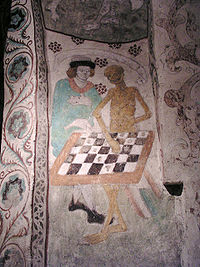
Cheating Death
Encyclopedia

Cancer
Cancer , known medically as a malignant neoplasm, is a large group of different diseases, all involving unregulated cell growth. In cancer, cells divide and grow uncontrollably, forming malignant tumors, and invade nearby parts of the body. The cancer may also spread to more distant parts of the...
without chemotherapy
Chemotherapy
Chemotherapy is the treatment of cancer with an antineoplastic drug or with a combination of such drugs into a standardized treatment regimen....
, a person who avoids by a narrow margin falling off a cliff or building or being shot or stabbed, or a person who survives hospitalization in critical condition
Critical Condition
Critical condition is a medical state.Critical Condition may also be:* Critical Condition , an episode of the television series Sex and the City* Critical Condition , a 1987 comedy film...
in spite of a poor prognosis
Prognosis
Prognosis is a medical term to describe the likely outcome of an illness.When applied to large statistical populations, prognostic estimates can be very accurate: for example the statement "45% of patients with severe septic shock will die within 28 days" can be made with some confidence, because...
from doctors all might be described as having "cheated death". In Greek mythology
Greek mythology
Greek mythology is the body of myths and legends belonging to the ancient Greeks, concerning their gods and heroes, the nature of the world, and the origins and significance of their own cult and ritual practices. They were a part of religion in ancient Greece...
, Sisyphus
Sisyphus
In Greek mythology Sisyphus was a king punished by being compelled to roll an immense boulder up a hill, only to watch it roll back down, and to repeat this throughout eternity...
cheats death by tricking Persephone
Persephone
In Greek mythology, Persephone , also called Kore , is the daughter of Zeus and the harvest-goddess Demeter, and queen of the underworld; she was abducted by Hades, the god-king of the underworld....
to let him return to the world from Tartarus
Tartarus
In classic mythology, below Uranus , Gaia , and Pontus is Tartarus, or Tartaros . It is a deep, gloomy place, a pit, or an abyss used as a dungeon of torment and suffering that resides beneath the underworld. In the Gorgias, Plato In classic mythology, below Uranus (sky), Gaia (earth), and Pontus...
.
Although it is difficult to find information about the origin of the phrase, it may be related to anthropomorphism
Anthropomorphism
Anthropomorphism is any attribution of human characteristics to animals, non-living things, phenomena, material states, objects or abstract concepts, such as organizations, governments, spirits or deities. The term was coined in the mid 1700s...
of death
Death
Death is the permanent termination of the biological functions that sustain a living organism. Phenomena which commonly bring about death include old age, predation, malnutrition, disease, and accidents or trauma resulting in terminal injury....
, more commonly known in English-speaking cultures
Anglosphere
Anglosphere is a neologism which refers to those nations with English as the most common language. The term can be used more specifically to refer to those nations which share certain characteristics within their cultures based on a linguistic heritage, through being former British colonies...
as the Grim Reaper
Death (personification)
The concept of death as a sentient entity has existed in many societies since the beginning of history. In English, Death is often given the name Grim Reaper and, from the 15th century onwards, came to be shown as a skeletal figure carrying a large scythe and clothed in a black cloak with a hood...
. Such personification has also led to a wide variety of pop-culture
Popular culture
Popular culture is the totality of ideas, perspectives, attitudes, memes, images and other phenomena that are deemed preferred per an informal consensus within the mainstream of a given culture, especially Western culture of the early to mid 20th century and the emerging global mainstream of the...
references, perhaps most notably being the depiction of death in Ingmar Bergman's
Ingmar Bergman
Ernst Ingmar Bergman was a Swedish director, writer and producer for film, stage and television. Described by Woody Allen as "probably the greatest film artist, all things considered, since the invention of the motion picture camera", he is recognized as one of the most accomplished and...
film The Seventh Seal
The Seventh Seal
The Seventh Seal is a 1957 Swedish film written and directed by Ingmar Bergman. Set during the Black Death, it tells of the journey of a medieval knight and a game of chess he plays with the personification of Death , who has come to take his life. Bergman developed the film from his own play...
, in which a knight proposes a wager with death over a game of chess
Chess
Chess is a two-player board game played on a chessboard, a square-checkered board with 64 squares arranged in an eight-by-eight grid. It is one of the world's most popular games, played by millions of people worldwide at home, in clubs, online, by correspondence, and in tournaments.Each player...
. In the film the knight comments that he knows death plays chess because he's seen it in paintings, possibly in reference to a medieval painting of death playing chess which hangs in Täby Church in Sweden
Sweden
Sweden , officially the Kingdom of Sweden , is a Nordic country on the Scandinavian Peninsula in Northern Europe. Sweden borders with Norway and Finland and is connected to Denmark by a bridge-tunnel across the Öresund....
. Playing chess offers the knight an opportunity to cheat
Cheating in chess
Cheating in chess refers to a deliberate violation of the rules of chess or other unethical behaviour that is intended to give an unfair advantage to a player or team. Cheating can occur in many forms and can take place before, during, or possibly even after a game...
. The popularity of Bergman's film has resulted in many parodies and may be responsible for the popularity of the idiom
Idiom
Idiom is an expression, word, or phrase that has a figurative meaning that is comprehended in regard to a common use of that expression that is separate from the literal meaning or definition of the words of which it is made...
"cheating death".
Cheating death is also a recurring theme in the Final Destination film series
Final Destination (film series)
The Final Destination series is a series of horror films based on an unproduced script written by Jeffrey Reddick for the X-Files television series. Distributed by New Line Cinema, all five films are centered on the themes of fatalism, predestination, and precognition, in relation to death...
.

